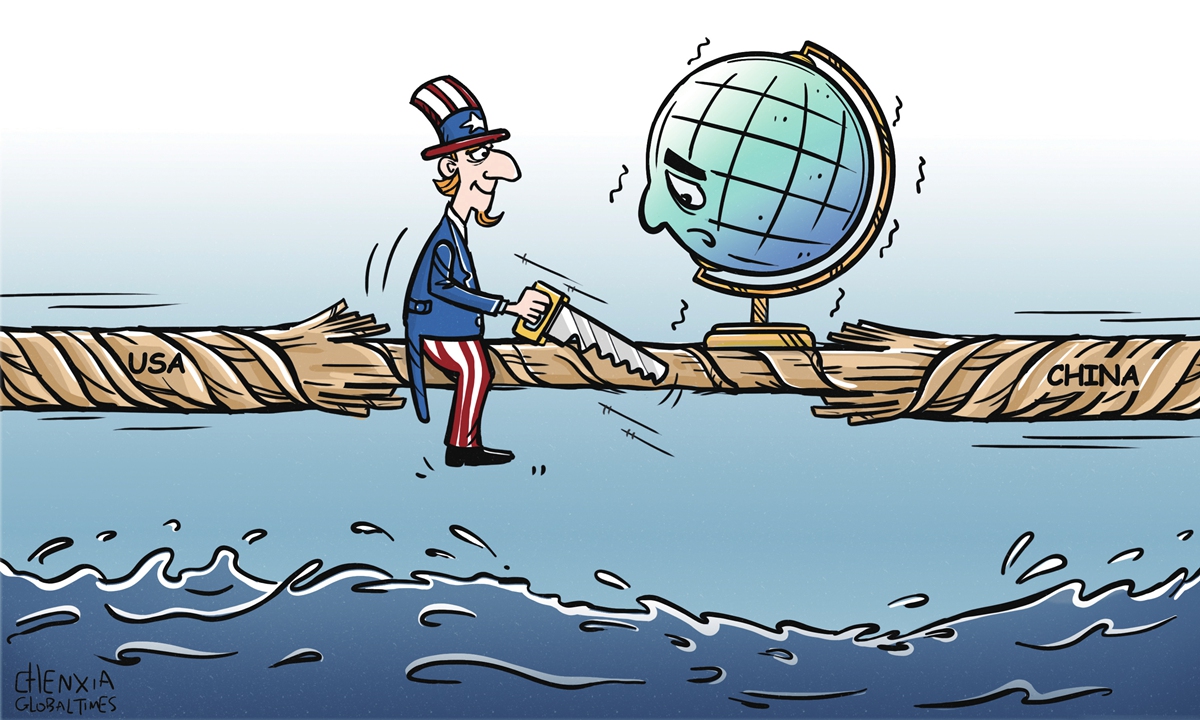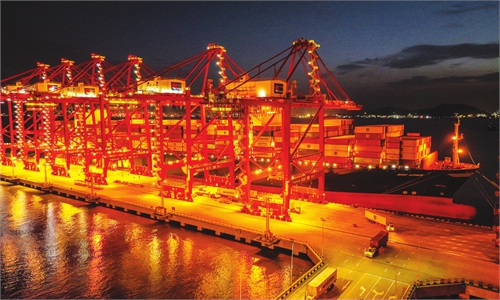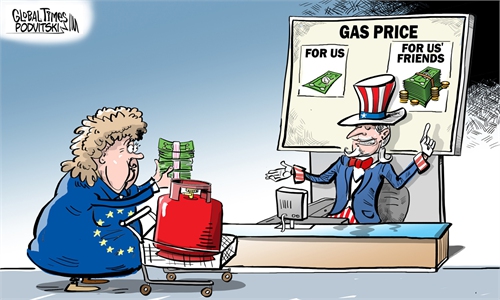
Illustration: Chen Xia/GT
As the US continues its push to "decouple" from China, more and more countries are seeing clearly the possible impact of such an irrational action on world stability.Except for Uncle Sam himself.
Shortsighted Washington is still dreaming of advancing its interests through "decoupling" from China. But its allies and partners seem to have understood the deep-seated and long-term dangers of "decoupling" better than the US iteself. German Chancellor Olaf Scholz, for example, warned that "decoupling is the wrong answer" because it would undermine the success of globalization. "We must continue to do business with China," he said at a business conference in Berlin last week.
Similar warnings have also been voiced from US partners in the Indo-Pacific region. On Tuesday, Singaporean Prime Minister Lee Hsien Loong said "decoupling" from China is worrying. Washington's export restrictions on chip equipment to Beijing - US' latest "decoupling" attempt - would "trigger further consequences and may result in less economic cooperation, less interdependency, less trust and possibly ultimately a less stable world," Lee noted.
Lee's remarks could easily find an echo in many Asia-Pacific countries and regions. Cooperation between China and the US is a blessing for these countries and regions, while confrontation is a disaster. Therefore, the US-China "decoupling," be it in whichever sphere, is not and will never be good news for them.
A Chinese international relations scholar, who requested anonymity, told the Global Times that it is difficult to make US-China "decoupling" a reality due to close economic ties and the need for their cooperation to tackle various global challenges. But Washington has already weaponized and politicized "decoupling." It will continue to try to forcibly promote "decoupling" from China, harming the interests of both countries and leading to more turbulent bilateral relations.
The US-China "decoupling" is not simply a dispute between the two countries. As great powers, China and the US have one of the most consequential bilateral relations in the world. Any minor fluctuations in such relations will likely bring instability on a much larger scale and in more areas. In other words, the adverse effects of a US-China "decoupling" are way bigger than the impact on the two countries' relations.
For instance, Washington's "decoupling" from Beijing has a huge negative demonstration effect on the region and around the world. The US often emphasizes, on bilateral and multilateral occasions, cooperation with partners "with shared values," and it is evident that China is not put in that category. The US is encouraging Western countries to reduce their economic dependence on those against the so-called Western values, including China and Russia, or in other words, to select future partners for economic cooperation based on ideology. This will inevitably hinder normal economic exchanges and cooperation, increasing mistrust and even conflicts between and among countries.
From the perspective of the industrial chain, if US' "decoupling" from China does come true, the development of the world economy will see more significant challenges. Song Zhongping, a Chinese military expert and TV commentator, points out that the economic and trade relationship between Beijing and Washington is an essential manifestation of global economic integration, under which goods and services can be provided as affordable as possible with the optimal division of labor among different countries and regions.
Song said that just like China and the US, other countries will also suffer from such a change in China-US economic relations, as the division of labor in the global industrial chain has already been established. And if the US forcibly dismantles the entire industrial chain through "decoupling," the production process will only be severely disrupted.
The instability caused by the US pursuit of "decoupling" from China can also be found in the security area. Under a "decoupling," the economic and trade relations - the closest ties between Beijing and Washington - will be weakened, or even substantially destroyed, resulting in more conflicts between the two powers. The world will, consequently, face bitterer divisions and more acute crises of stability.
The development of China-US relations has proved that, despite the enormous differences in many fields, countries can still coexist and develop together through cooperation. But the US has now lost its judgment in the geopolitical game against China, which has greatly undermined the stability of the already sensitive and fragile bilateral relations.
Washington has to realize that "decoupling" from China should not be part of the game it plays. It needs to be cautious about using this major economic decision as a weapon in an all-out strategic competition with China, because no one will win if that happens. To treat relations with China rationally and pragmatically means more stability for the world, and to do so or not - the ball is now in Washington's court.



